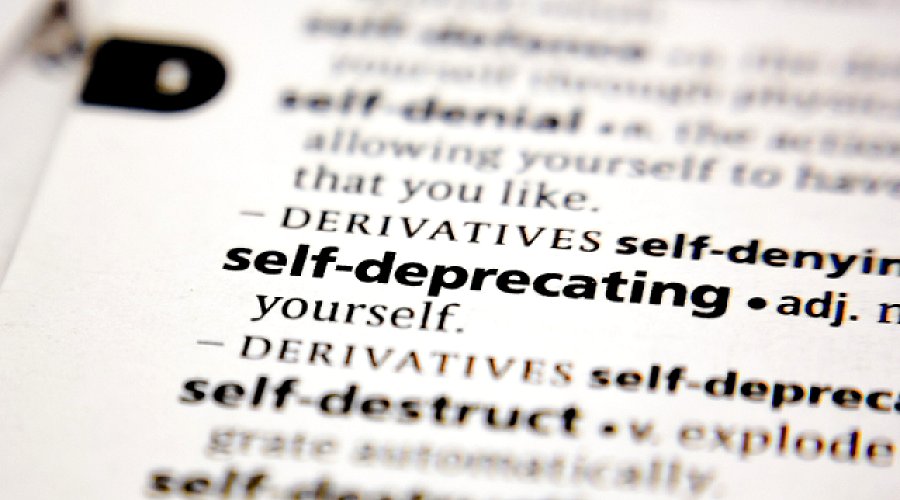Understanding Self-deprecation: Meaning, Signs, & Impact
Published on 30th December, 2022

We’ve all done it – making fun of ourselves in a social setting, hoping for a laugh or pointing out your flaws to a friend or partner, hoping they will disagree. Unknowingly, we tend to put ourselves down in favour of appearing modest or humble, especially in social settings. As human beings, it is common to care about what others might think of you, leading you to place importance on presenting yourself as humble rather than talking yourself up. It is possible to undervalue yourself to a certain extent as a form of humour. However, doing it too often might be a sign that you are using self-deprecation as a maladaptive habit.
What is self-deprecation?
Employing language that belittles your accomplishments with declarations like “Oh, it is no big deal, anyone could have done it” is commonly associated with self-deprecation as these kinds of statements contain a negative self-evaluation (Sciangula & Morry, 2009). Self-deprecating refers to belittling and undervaluing yourself to make others think there is nothing extraordinary about you.
Conceit is one of the last impressions you want to leave when interacting with people. To avoid this, people tend to downplay their positive attributes or even insult themselves to appear humble and likeable (Plumptre, 2022).
Signs of self-deprecation
Here are some of the common indicators of self-deprecating language and behaviour:
- You feel that you don’t deserve praise
- You are hesitant to accept others’ praise outrightly for fear of looking prideful or insufferable
- You avoid giving importance to your work and achievements
- You instinctively downplay yourself
Exhibiting signs of self-deprecation includes possessing a negative mindset about your personality, work, looks and appreciation of others. You tend to put others before yourself by making sure they feel good about themselves instead of complimenting yourself and acknowledging your hard work and efforts.
Impacts of self-deprecation
By self-deprecating, joy can be eliminated from every opportunity-major or minor. You may struggle to find excitement in embarking on a new project or celebrating its completion when your default position minimises your valid feelings and accomplishments. There may be a negative impact on self-esteem and self-perception when self-deprecation is normalised.
How to balance out self-deprecation
Continuing on a path of self-deprecation can make our unhappiness worse. Self-deprecation can be stopped without feeling shame that negative thoughts have arisen.
- Accepting compliments
Accepting compliments might be a significant change for you. Contrary to what you might think, accepting praise will not make you appear insufferable. Rather, thanking people for noticing your efforts shows gratefulness and humility as well.
To break the vicious cycle of constantly putting yourself down, try getting used to receiving applause, flattery, and congratulations. In the long run, this change will benefit your happiness and well-being.
- Keep a journal
You can gain much insight into your beliefs by journaling. Journaling can even identify situations or communications where you have made self-deprecating remarks. It also allows you to reconsider your writing and re-evaluate your thoughts. This can help you overcome negative thought patterns.
- Seek professional help
Cognitive Behavioural Therapy (CBT) improved the self-esteem of participants over time, according to psychologists at London South Bank University in 2018 (Kolubinski et al., 2018). Seeking psychotherapy services can provide individuals with a safe and objective space to be honest, and work toward a more positive mindset.
Conclusion
Self-deprecation is a common deflecting tactic we use when communicating with others to avoid appearing too serious. Even though this strategy can be used harmlessly from time to time, it can also affect self-esteem and feelings of self-worth when used too frequently. Adult counselling services in Singapore could help if you find it difficult to break out of self-deprecating tactics.
Overall, it is essential to remember that you can accept praise and compliments from others without needing to put yourself down constantly. Remember to show yourself more kindness and understand self-love as a process.
References
Plumptre, E. (2022). Self-Deprecation: Harmless Habit or Unhealthy Behaviour? https://www.verywellmind.com/what-is-self-deprecation-5186918#toc-impact-of-self-deprecation
Sciangula A, Morry MM. (2009). Self-esteem and perceived regard: how I see myself affects my relationship satisfaction. J Soc Psychol. 2009;149(2):143-158. doi:10.3200/SOCP.149.2.143-158
Kolubinski, D. C., Frings, D., Nikčević, A. V., Lawrence, J. A., & Spada, M. M. (2018). A systematic review and meta-analysis of CBT interventions based on the Fennell model of low self-esteem. Psychiatry research, 267, 296-305.